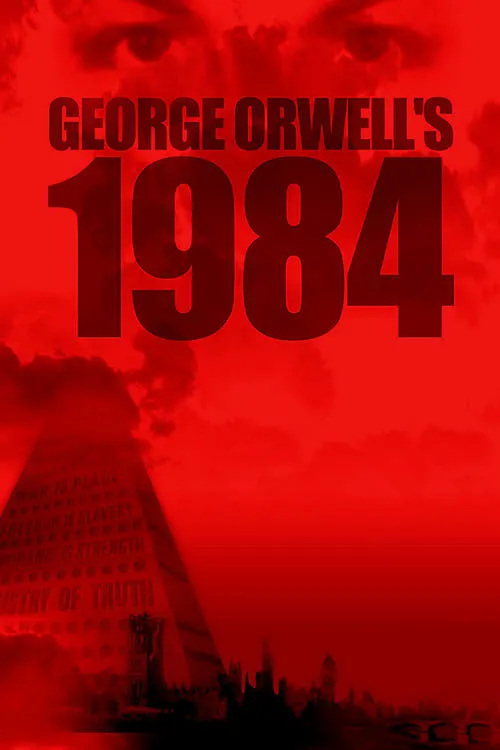Nineteen Eighty-Four

Enredo
In George Orwell's dystopian classic, Nineteen Eighty-Four, we are introduced to a bleak, totalitarian future where the ruling Party, led by an enigmatic and all-powerful figure known as Big Brother, has complete control over the inhabitants of Airstrip One, a former Britain under the Party's domination. The year is 1984, and the once-great nation has been reduced to a state of poverty, fear, and surveillance. The protagonist, Winston Smith, is a low-ranking member of the Party, working in the records department at the Ministry of Truth, a propaganda machine that constantly alters historical records to fit the Party's ideology. Winston's work revolves around falsifying records, erasing the truth, and creating a false narrative to keep the population in line. On the surface, Winston appears to be a conforming member of society, yet deep down, a spark of rebellion has been ignited within him. Winston's thoughts are influenced by the works of the philosopher Emmanuel Goldstein, who is now considered the ultimate enemy of the State. Goldstein's ideas have been outlawed, and the people are encouraged to inform on one another if they suspect anyone of harboring dissenting views. Winston's desire to rebel against the Party is further fueled by his encounters with a fellow worker, Julia, who shares his sentiments. Julia is a beautiful and intelligent young woman who, like Winston, has grown disillusioned with the Party's rigid control over their lives. The two begin a clandestine love affair in secret, their trysts taking place in hidden, underground areas where the Party's ever-watchful eyes do not seem to penetrate. This forbidden love becomes the catalyst for their rebellion, as they start to question the Party's authority and seek a way to overthrow it. As Winston and Julia's relationship deepens, they become more daring in their actions. They begin to steal moments of pleasure and individuality, indulging in forbidden activities such as listening to music and making love. These acts of defiance are mere sparks in the darkness, but for the first time in their lives, Winston and Julia feel truly alive. Their rebellious desires, though small, do not go unnoticed. A mysterious figure, O'Brien, who serves as the Party's representative in the district, has been monitoring Winston's activities. O'Brien's true intentions are unclear, but he seems to be watching Winston, waiting for him to make his next move. Winston and Julia's plans for rebellion take shape when they visit an antique shop, where they purchase an old, abandoned diary. In this act of subversion, they are able to momentarily break free from the Party's grasp, experiencing the joy of writing and recording their thoughts without fear of reprisal. This small act of creative expression emboldens the couple, and they begin to dream of a future where they can live freely, without the Party's suffocating control. However, their rebellion is ultimately doomed from the start. Winston and Julia's love becomes the focal point of the Party's surveillance, and O'Brien's true intentions are revealed. As Winston becomes increasingly involved in the Brotherhood, a secret organization bent on overthrowing the Party, he is arrested and taken to the Ministry of Love, a place of torture and reeducation. Through the Party's Ministry of Love, Orwell masterfully depicts the horrors of totalitarianism. The Party's agents, including O'Brien, are trained to extract information and crush dissent, and Winston is forced to undergo a series of brutal and humiliating treatments, designed to break his spirit and will. As Winston's world collapses around him, he is forced to confront the reality of his situation. He realizes that his rebellion, though noble in intention, was doomed from the start. The Party's grip on Airstrip One is too tight, and its enemies too few. Julia, too, is captured and subjected to similar treatment. In a heart-wrenching finale, Winston and Julia are forced to renounce their love for one another, and to betray the Brotherhood. Winston, broken and defeated, is finally taken to Room 101, the darkest, most feared place in the Ministry of Love, where his deepest fears are realized. In a last-ditch attempt to preserve his dignity, Winston refuses to love Big Brother, but in so doing, he confirms his own destruction at the hands of the Party. In the end, Winston is reduced to a shell of his former self, a mere puppet of the Party, forced to repeat the mantra "I love Big Brother" in a desperate attempt to cling to his remaining shred of humanity. Orwell's Nineteen Eighty-Four is a harrowing portrayal of the dangers of totalitarianism, a world where individuality is brutally suppressed, and free thought is anathema. The novel stands as a powerful warning, a testament to the importance of preserving our individuality, our love, and our humanity in the face of overwhelming oppression.
Resenhas
Recomendações




